Celebrating a Six Decade Heritage of Caravan Manufacture
This year we are celebrating 60 Years of Elddis – our Diamond Anniversary.
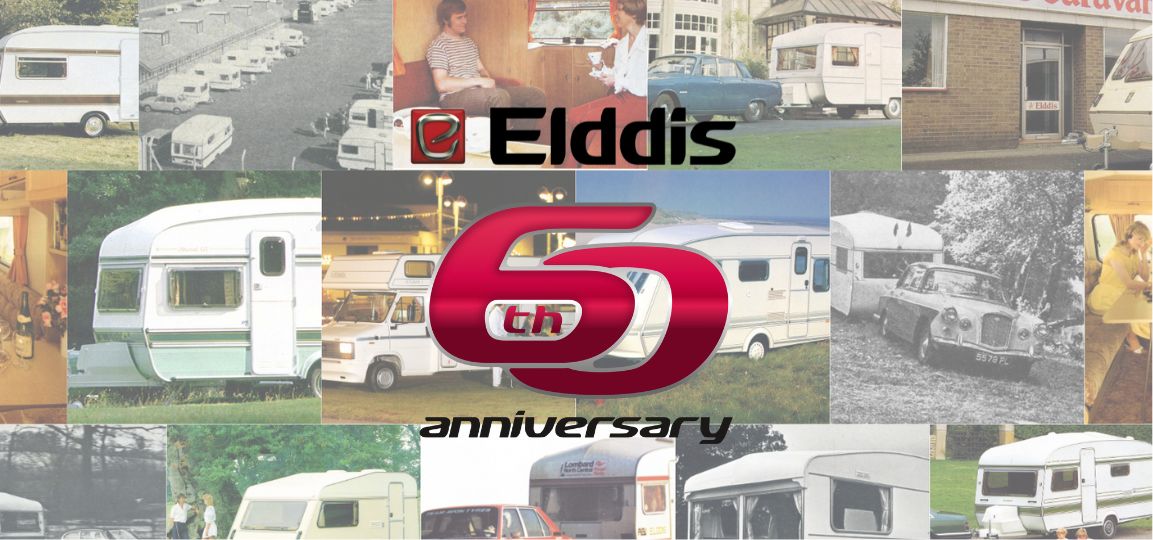
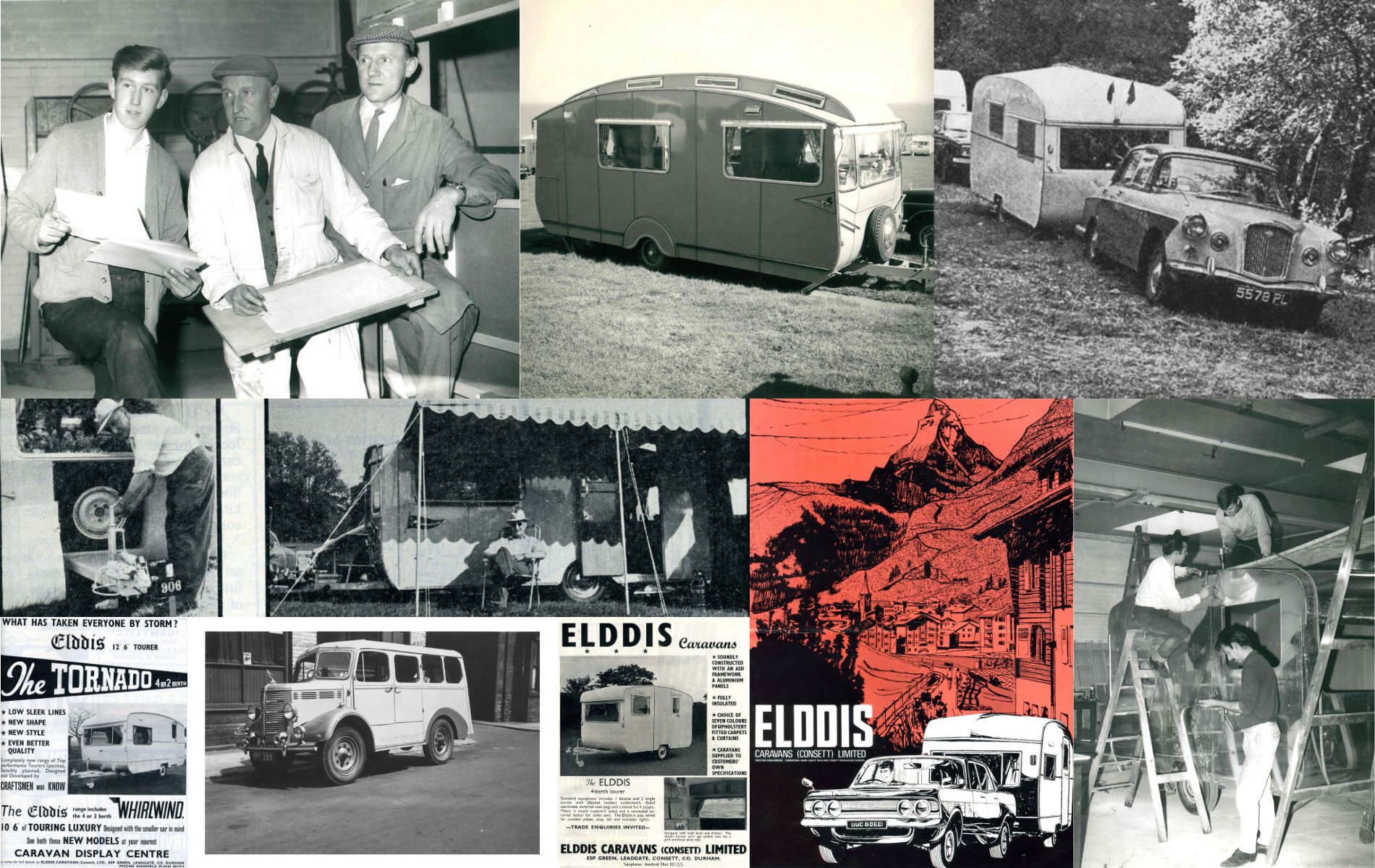
From the very first models produced, the Elddis name has been associated with quality finish at the right price. Elddis has always provided the discerning caravanner with a touring caravan which is durable, reliable, well-equipped and, overall, a tourer which has class-leading style, yet provides unbeatable value for money.
Elddis was one of the first caravan manufacturers to enter the motorhome market in late 1985 and since then has become a leading motorhome manufacturer in the UK.
Then, in 2019, Elddis launched its all-new campervan range with roaring success, with a growing community of thousands of CVers taking to adventures on four wheels!
How it all started -The Elddis Story
The Elddis story began when locals Siddle and Mary Cook took up caravanning in the 1950s as a way to relax from the stresses of running his haulage company (in operation today as Elddis Transport). Siddle and Mary had owned several touring caravans from different manufacturers in their early caravanning days. Keen ralliers, they quickly realised that there wasn’t a caravan on the market that provided everything they needed. With this experience behind them Siddle decided to design a tourer that would suit their needs better. Not only would he design the caravan, but he would build it too! So, by late 1962 the very first Cook caravan was built. Siddle had added design features that in time would become the norm on more modern tourers!
The outcome of his efforts was a two-berth, 4-metre long model. Siddle and Mary wanted to make sure it was up to their rallying needs, which saw them caravanning most weekends. To keep the ‘home from home’ feel the Cooks decided to add some practical, yet luxury features in their design. These included a fridge, 12-volt lighting system, radio, compressed air reverse system and even a record player! Siddle also decided to add a spare wheel and designed a front integral storage compartment for it, too. In caravans of the time, very few makers - unless a luxury brand - had these items as standard.
Building your own caravan in this era was not unusual - or if you didn’t build your own from scratch, many buyers improved upon an existing maker’s model. This DIY caravan idea had evolved from the 1920s and, to encourage high standards of self design and construction, the Caravan Club at their national rallies organised competitions in various areas of improvement or construction and in the design of amateur-built caravans, or as they also became known, the ‘Non-Prop’.
The Cooks saw this as an opportunity to enter their caravan and decided on the Caravan Club’s National Rally held at Longleat in Wiltshire in 1963. Siddle Cook won his class, giving him the inspiration for the Cooks to go onto making caravans as a business.
With his son Ray, Siddle built another tourer in late 1964 and branded it Elddis. This was Ray’s idea, simply turning the name Siddle backwards!
The first-built van was straight forward in its external appearance and internal design. Few were built, but this model provided four berths in a 3.5 m length. No washroom was fitted but the Elddis came with cooker/grill, gas lights, wardrobe and a side locker to store a toilet tent. The Elddis even came with a tea set as standard! It was fully insulated (not many caravans were then) and could be ordered to an individual’s own specification, adding a fridge plus a heater. A choice of soft furnishings was produced, altogether giving seven different design options.
Towards the end of 1965 the Cooks went back to the drawing board, to tweak the Elddis design, implementing further ideas and improving the design yet further. The small works they had acquired at Esp Green at Leadgate, near Consett, was producing a couple of touring caravans a week.
The Cooks were also working hard to set up a chain of Elddis dealerships, one of the first being Pearman Briggs at Gloucester who remain a successful Elddis dealer today! But, with a new design - plus more models on the drawing board which offered two different body lengths - it wasn’t long before more dealers were added to the Elddis portfolio.
These redesigned Elddis tourers would be introduced midway through 1966, superseding the second-generation designs. It was with the introduction of the new models that ‘wind’ names were first used. The 3.20m length model was the Whirlwind, produced in two- and four-berth layouts. The second model was the 3.83m length Tornado – also available in two- and four-berth layouts, both including a washroom. Prices were lower for these ‘production built’ new models and cost from £309 for the two berth Tornado.
Aimed at the ‘Clubman’, these new models would seal the success of the Elddis range of tourers. The Esp Green factory, which was now turning out models at a production rate of around seven tourers a week, was also producing light sailing craft. Boat production continued until 1968. During this era, disaster struck the Elddis factory on the 26th March 1967. Fire destroyed several caravans and damaged part of the factory. Production was stopped but a reorganisation of the undamaged part of the factory soon saw production back on track. However, the Cooks realised a larger factory was going to be required as demand was now rising, with several export orders on the horizon.
A new, larger site was found on Delves Lane in Consett and work began on a new £27,000 factory complex in mid-1967 with improved floor space of over 16,000 sq ft.
By August 1968 the new factory was up and running with 15 new Elddis models being produced each week, rising to 40 units. Introduced in 1968, a new 4.44m length four-berth named the Cyclone was introduced, which came complete with end kitchen. The Cyclone made its debut at the Earls Court Caravan show in London, the first time Elddis had ever exhibited at a major show.
Exports were also now playing a major role in the Elddis business, boosted by a £150,000 order for 110 Tornados for the Swedish market. The Elddis brand took Europe by storm! Elddis had, in a short period of time, become a fast- growing company … and all started by Siddle and Mary Cook’s home-built special edition!
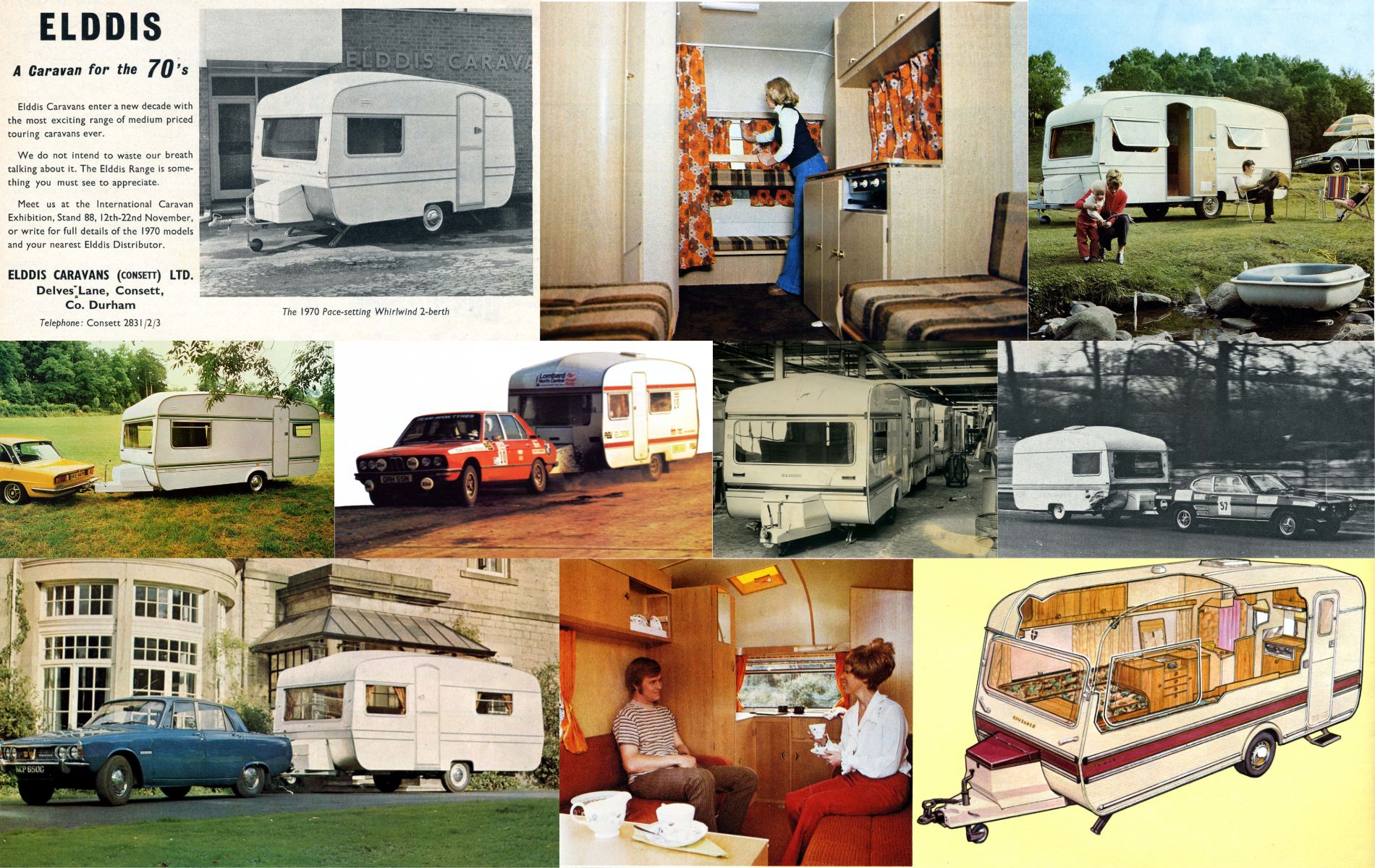
A new decade and new challenges
In 1970, Elddis received a new updated profile – a shape that would last until the early 80s – and which featured, for the first time, an external drawbar-mounted gas locker as a standard feature.
The 70s saw further success both at home and abroad, with Elddis gaining custom from discerning caravanners. Real Japanese oak veneer and quality fittings gave the Elddis range instant appeal. Specification included a 12-volt strip light and gas lamps, twin burner hob and grill, plus foot-operated water pump for the kitchen only. Carpets and polystyrene insulation completed the Elddis specification for mid-priced tourers of the day.
For the 1971 season the Mistral name appeared as a new two berth layout in a 3.83m body length. This new end-kitchen couple’s model was well received by both the caravan press and the buying public alike. Elddis also tweaked their distinctive profile further, making Elddis look even smarter and more distinctive than before! In those heady days of caravanning, an annual British Caravan road rally event was held by the Caravan Club, which was also sponsored by several magazines of the day. This saw both private and trade entries from manufacturers and dealers alike.
Elddis began entering as a manufacturer in 1971, with the then recently-launched British Leyland Austin Maxi car towing the new Elddis Mistral. The outfit won the ‘Concours d’Elegance’. The following year, Ray Cook won again with his Austin 1300 Countryman / Elddis Whirlwind two-berth combo! All great publicity for Elddis, boosting sales still further.
The early 70s saw a fraught and highly-competitive home market and changes were afoot. The success of the Elddis brand was a threat to competitiors and the large, recently formed A.B.I Caravans saw Elddis as main competition against its Ace range of medium-priced tourers. In 1973 a deal was completed which saw the Elddis brand bought by A.B.I., based at Beverley, near Hull. The Elddis factory was, however, to stay and produce Elddis as an independent brand, using some components from A.B.I. The Cooks remained on the board until 1977 and, after leaving, formed another caravan brand, Compass, in 1979. A name which would later feature alongside the Elddis brand for many years.
It was 1973 that would also see a landmark for the Elddis brand, in that year, with 76 Elddis tourers in attendance at a specially held rally for Elddis owners, the foundation of the Elddis Owners Club was established.
Held at Brandling House at Gosforth Park, just north of Newcastle, the rally was given the backing of Elddis, who organised a works visit. With a buffet held in the evening, it proved a great success. From that first meet the Elddis Owners Club was organised into various regions of the country. The Club continues to go from strength-to-strength, led by loyal and longstanding members, with newcomers enjoying the camaraderie and family-friendly rallies.
It was in this period the oil crises struck and the three-day working week - along with VAT - was introduced. This saw tourer sales across the industry fall dramatically, with some sadly being forced out of business. Elddis sales remained good, even though costs were climbing, as the Whirlwind, Tornado, Mistral and Cyclone penetrated the harsh market conditions, providing quality build and appealing designs and layouts.
A.B.I.’s influence would steer the Elddis brand with such design features as extended drawbars and wider track chassis design in 1977. Both these features were key in improved stability on the road and had been implemented with the experience gained with the caravan road rallying and high-speed track events.
By 1975 the Elddis portfolio now consisted of the 5m body length caravan with end kitchen layout - the Sirocco, a six-berth family van. Not resting on their laurels for the 1976 model year, Elddis introduced the Crusader range - just two luxury Elddis models, using extensive smart GRP mouldings for the roof, rear and front panels. The use of the GRP panels put Elddis ahead of the game with the Crusaders’ overall appeal.
Elddis Crusader’s luxury design included rosewood finish for all the furniture and a high spec list, which included the then-rare electric hook-up point. Made only in a two-berth and four-berth layouts, the Crusaders proved expensive to build and the range was paused after just one season. However, the Crusader range was re-launched at Earls Court in 1978 but in a different guise, although still with a high specification including central heating and radio cassette player.
Elddis also launched another new layout in the standard range in 1976 – the centre washroom four-berth Shamal in a 4.44-m body length. Another layout that would prove successful with families.
In 1977, two major Elddis events happened. First the familiar Elddis profile was changed for a squarer look and, also, to celebrate the Queen’s Silver Jubilee, Elddis produced the unique Silver Jubilee Mistral – offering heater, fridge, tinted windows and Glace white exterior. A batch was made with one only for each Elddis dealership.
The 1977 shape may have looked distinctive, but it had been heavily influenced from the A.B.I design team. The Elddis buyer was more traditional in taste and, after just one season, the Elddis profile from the year before returned with some tweaks. Exteriors saw green coachlines (green would become an Elddis colour used for some of the exteriors until 1997), whilst the interiors remained largely the same. By the end of the 70s the Elddis brand would be stronger than ever!
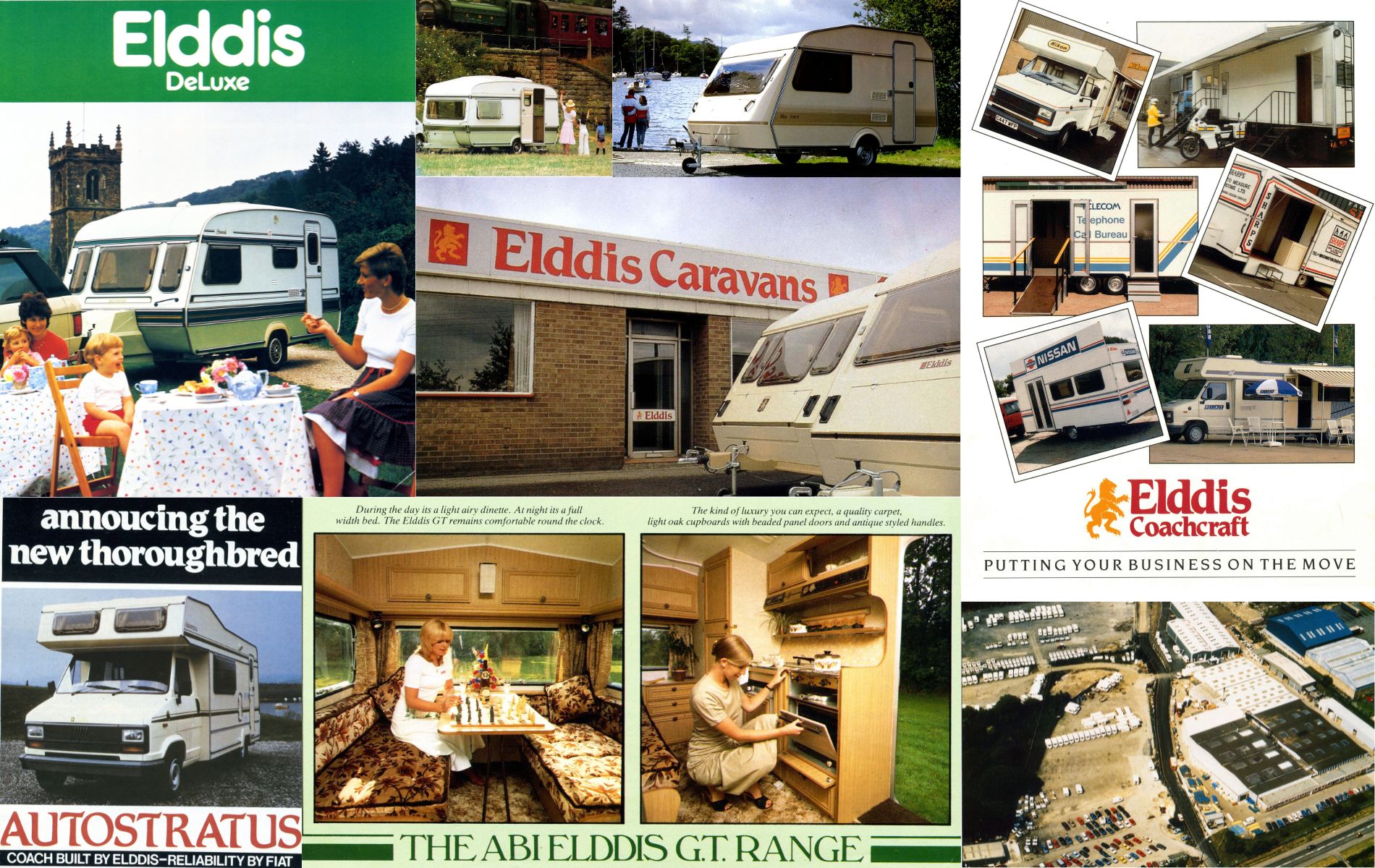
The 1980s - another decade of change
The beginning of the 80s was not a good time for the Caravan Industry in general, with many manufacturers ceasing production due to the downturn in sales. Most of this downturn was due to the general economic state of the UK’s economy. The high value of the pound saw the caravan industry’s export trade virtually dry up, from thousands of units down to just a couple of hundred.
However, the Elddis answer was to simply provide even better value and attract buyers this way. Fridges and heaters were to be fitted as standard, along with double glazing. The new GT range - added in 1981 - included mains electrics, hot water, shower, space heater and oven as standard kit. Elddis was increasing its market share with new models and ranges.
The Elddis range would also receive an overhaul, with the body profile being changed, but at the same time sticking with Elddis tradition. The GT range was given a more aerodynamic profile and triple front windows. The AL-KO chassis was now standard on all Elddis models, replacing the B&B chassis. Sales began to improve in the industry as a whole. With its lighter, better equipped models and enhanced comfort, Elddis would see its sales surge by the mid-80s.
New models, such as the Hurricane in 1983 and the Pamperos in 1984, were launched, adding more layout options. By late 1984, dealers were reporting that their ‘84 Season models had all but sold out and that demand in general for the ‘85 model year was proving high, starting a new upsurge in Elddis sales.
Another milestone in the Elddis story was the introduction of the company’s first ever twin-axle model - the Sirocco GT. Well equipped, it showed Elddis was ahead of the game, foreseeing the future popularity of twin-axle caravans. The experience of producing the early GT twin-axle Sirocco would prove beneficial for the future twin-axled Crusader range.
After a short absence of two seasons, Crusaders made a triumphant return and this time had model names such as ‘Earl’ and ‘Emperor’. With super-aerodynamic fronts, integrated gas lockers, rear roof spoiler and strong burgundy coachlines, the new Crusaders proved distinctive.
It was also in the mid-80s that Elddis branched out into special unit builds. Elddis Coachcraft, as it became known, built units such as mobile showrooms and offices, built for customers such as Radio Humberside, Nissan UK, BT and several police forces. Most were trailer units, whilst some were motorised. This further enforced the reputation of how versatile and skilled the Elddis workforce was at producing all types of units and not just tourers. This experience would be the foundation of the motorhome side of the business.
Meanwhile the parent A.B.I Group influence continued, apparent in the new entry-level Elddis Breeze, launched at the NEC Caravan and Boat show in February 1984 and based on the successful A.B.I Ace Marauders. Basically, it was a re-badged Marauder with Elddis graphics, but it was a market that Elddis had yet to discover! This badge engineering gave Elddis a way into this sector of the market. By 1987, Elddis launched a limited edition Whirlwind - named the ‘Wisp’ - as an entry level Whirlwind in the XL mid-market range. The success of this one entry level model spawned Elddis’ dedicated entry-level Wisp range in 1988. With the A.B.I connection, Elddis was chosen to build another range of tourers at its Consett factory.
In late 1985, Hull-based caravan manufacturer Deanline was to go into liquidation, just as its 1986 models had been released. A.B.I. bought the company from the administrators with the aim to carry on the manufacture of their Crown ranges. By early 1986, the Deanline name was dropped and Crowns were built at the Delves Lane factory for one year only. However, the Crown name would reappear in 1994. By the end of 1988 four model ranges were in force, Crusader, GTX, XL and the ever- popular Wisp range. Elddis had covered all market areas well and would benefit from this strong position when sales of new tourers in general slowed down at the early start of the 90s. Elddis finished the 80s on an all-time high, with sales and production increasing each year.
Elddis enter the motorhome market
With Elddis watching the ever-changing market and with its recent coachbuilding experience, it was decided to enter the growing coachbuilt motorhome sector in late 1985.
Using a Fiat Ducato 2-litre petrol engine (optional diesel) with five speed gearbox, the new Elddis motorhome was named the Autostratus and would become the foundation for a vast expansion into the motorhome market. The new Autostratus was a five-berth with overhead cab bed, side dinette and settee with rear kitchen and corner washroom. The cost was a competitive £14,114, yet had an extensive specification that gave the vehicle a luxury tag.
By 1988 Elddis was making its mark in the expanding motorhome market. The surge in demand for the Elddis motorhomes meant a new factory extension. The first Elddis Autoquests were launched, along with a micro coachbuilt motorhome built on the Bedford Rascal chassis, named the Nipper, in 1988. The motorhome side of the business was expanding along with the Elddis dealer network.

The challenging 90s
In 1990, Elddis celebrated 25 years in business. It had also become more apparent that Elddis was becoming more independent from its parent company A.B.I. / Minstergate PLC. The decision was made to split from A.B.I. A buyout by the Elddis management saw Elddis take back the reins in 1990. With total control of the Elddis brand, the new six man buy-out team, headed by then managing director Bob Dickinson, would now further concentrate on putting Elddis firmly on course to becoming one of the UK’s largest touring caravan and motorhome manufacturers, as well as a strong brand in European markets.
Elddis saw in the new decade with closer ties to some of its dealers; this would see Elddis come up with retailer special edition models produced in limited numbers. ‘Force’ and ‘Vogue’ were just some of the ranges to be produced for Barrons, Knowepark Caravans and the then Quality Caravans dealership. Based on the popular XL and Wisp ranges, these dealer specials would be produced for several seasons. Retailer special edition ranges of Elddis caravans, motorhomes and campervans continue today, in partnership with the UK’s largest leisure vehicle retailers, providing Elddis customers with unparalleled choice and added value.
In 1991, Elddis built special narrow-bodied Wisps for the Japanese market, whilst expansion would see over 300 employees at the Consett factory. Elddis was also expanding its motorhomes – literally - with new larger luxury models such as the Emperor and Monarch, whilst the Voyager range was launched in 1990. The extremely successful Autoquest range continued and is still a bestseller today. Ex England cricket captain Iain Botham used an Elddis motorhome for his well-publicised charity walks and, in 1993, he cut the ribbon on Elddis’ new parts warehouse, housing over £300,000 worth of spares.
More models were added to the Elddis stable: limited editions such as the EX200 range in 1992, based on Mistral, Hurricane and Shamal layouts. Sprung upholstery and blown air heating were added and Elddis brought out four two-berth models named Earl, Nobility, Knight and King - names last used on the third-generation Crusaders. Other limited editions also appeared in 1993, with the Gulfstream and Jetstream family tourers.
Elddis also launched a limited edition range in 1993, which was to be super-affordable and lightweight, rekindling the Breeze name for this Wisp-based four layout range.
In 1993, with great sadness, Elddis announced that Siddle Cook, founder of Elddis, had passed away. Siddle had, with his son Ray, built up the hugely successful brand in less than a decade.
In 1994, Elddis decided to launch a new range of tourers. Named ‘Crown’, this brand had been produced at Elddis back in 1986 under A.B.I. ownership. The new Crowns were completely different in exterior profile from the Elddis ranges and a complete departure from the original Crown caravan design.
The Elddis badge was not used and these Crown models were built to be sold by non-Elddis dealers - although most took the Crown range on anyway! The portfolio included the standard Crown and upgraded ‘Golden Crown’ with added specification. Crowns would also become a tourer used for retailer special editions – and all except Golden Crowns continued until 2000 model year. Elddis also upgraded the Wisp to ‘Wisp Supreme’, adding hot water, blown air heating, oven and more luxurious soft furnishings, plus bold burgundy side bands.
The 1995 model year – launched in September 1994 - was Elddis’ 30th Anniversary. To mark 30 Years, the company produced a special edition range named ‘Vogue’. These models gave extras such as mains lights, flyscreens and blinds, blown air heating, oven, TV aerial, shower and sprung upholstery.
In addition, the compact, lightweight ‘Elf’ two-berth was launched and brought Elddis ownership to those driving smaller, lighter cars.
1996 models saw the Vogue range established, with two new layouts being added, resulting in an eight-model line-up.
Elddis was also concerned with the increase in unladen weights, so worked on this problem and managed to shave of 25 kgs across all the ranges. The budget Wisps would see in 1996 with new graphics and new front GRP panel, but the Wisp range would eventually be dropped after that model year.
By the end of the 90s Elddis committed to retailer special editions in a bigger way than ever before, supplying most of its dealerships with specials as well as standard product.
One of the big success stories of the Elddis ranges in 1996 was the EX300 range. Sheer value for money offered by a package of mains lights, full blown air heating, shower, flyscreens and blinds, TV aerial and full oven. The EX300 range brought the sought-after Elddis badge into many buyers’ budgets.
Elddis designers continued to develop touring caravans and surprised the public and trade with the wind-cheating Genesis range at the Earls Court show in 1996. This unique new Elddis sold in limited numbers and may have been divisive in its futuristic design (for the time!), but it proved that Elddis was capable of producing a tourer with distinctive styling and innovative features. The Genesis may have had only two layouts and lasted just one model year, but it influenced future Elddis models.
Genesis may have gone, but the Elddis GTX ran with the exterior – albeit in toned down form – combined with a high spec for those who wanted to tour all year round. The Crusader range also got the GTX profile and even more luxurious fittings. A novel feature in both GTX and Crusaders was the space-age circular shower cubicle in the end washrooms.
By the 1999 Season, the XL Elddis range had been brought back and it to now shared the GTX and Crusader profiles. Front panels were all ABS (plastic) plus all Elddis models were running on lightweight BPW chassis replacing the AL-KO units. Nineteen models were now in the Elddis line-up, offering masses of choice. However, another old favourite would return for mid-1999 - the EX2000, replacing the GT range.
At the end of the Millennium, the factory – in use from 1968 - had now also become too small and, with an opportunity for the company to move into a new premises just yards away, the move was made to where the current facility resides in Delves Lane.
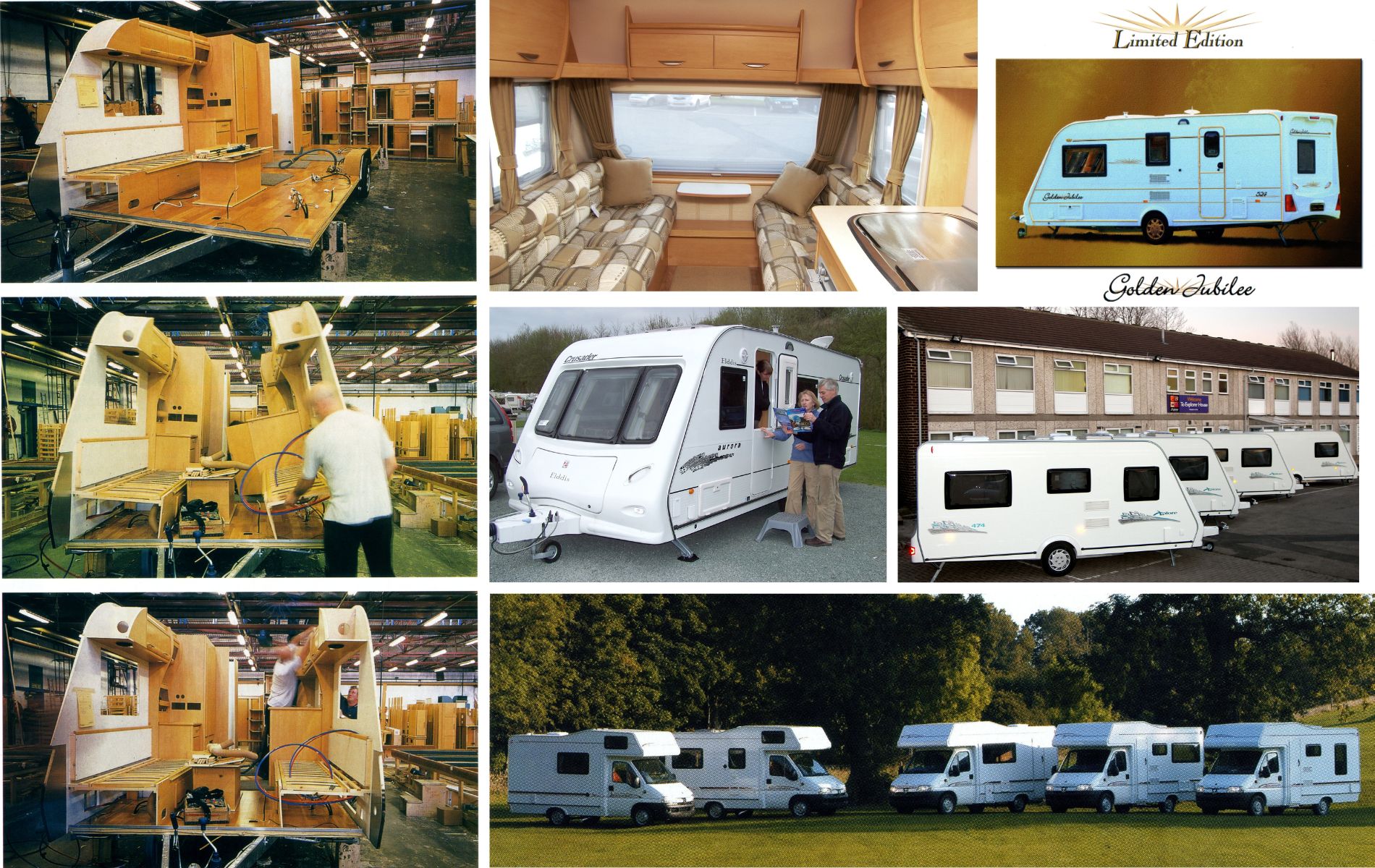
Elddis move into the 21st Century
With the new century Elddis continued to gain sales.
Armed with a host of awards won by Elddis tourers and motorhomes over the last decade, by now the company was now the third largest in the UK and its products first on most buyers’ lists.
Twin-axled Crusaders would receive new interiors which felt more opulent than ever before.
In late 1998, Elddis formed The Explorer Group and, at the same time, acquired the luxury brand Buccaneer, based near York. With a reputation for top quality luxury touring caravans, Buccaneer was brought into the Elddis factory and redeveloped for the 1999 season. Buccaneer continues to be built today, in the same factory as Elddis, successful as a leading Brand in its own right and appealing to the pioneering caravanner, with it’s prestige portfolio: www.buccaneer-rv.co.uk
In 2001, Elddis launched its budget-friendly Avante range – another name and range which continues today and remains the volume-seller in the Elddis range.
The launch of the Elddis Avante range saw the unveiling of a hugely competitive (under £10k) priced tourer, which would aim itself at the lower end of the market, but included such items as blown air heating, oven, Heki roof vent, along with flyscreens and blinds. The Avante would prove itself as a serious contender for the sub £10k caravan, with high volume sales. Quality touches included brushed steel cupboard handles and interiors that looked very much more upmarket than their asking price suggested. In fact, so good was the Avante, that Elddis retailers rushed to use it as the ideal base for dealer specials – many of which are still going strong today!
The 2002 model year saw the Avante tweaked and the arrival of the mid-range Odyssey. Sharing the Crusader profile, Odyssey came as a seven- model line-up, covering all the popular layouts including fixed beds.
Crusaders continued to provide luxury touring with layouts such as the Super Sirocco with its fixed bed and rear full-width washroom and front L shaped dinette.
Apart from updated upholstery, the Elddis range went into 2002 with little change; however, 2003 was to see the introduction of the new BPW Swing V-Tec chassis, ensuring better stability for all Elddis tourers.
Avante received new front and rear one-piece moulded panels, bringing the exterior more up to date. Interiors benefitted from new mains lights and a more homely feel. New models such as the 540, 472, 556 and 475 were added ensuring Elddis had this market sector well covered.
For 2005 the Odyssey was given a slight uplift in both spec and exterior styling, while such items as spare wheel and carrier came as standard. To add to its already smooth towing qualities, from 2005 all Odysseys had the Winterhoff WS3000 stabiliser fitted as standard. Crusaders received further improvements and the already impressive Crusader twin-axles received new design domestic-style shower cubicles.
In 2006, Elddis were the first to introduce Seitz privacy windows on its Crusaders and Odyssey ranges - letting caravan owners see out, but no one look in!
In an effort to keep Elddis ahead and keenly priced, the Explorer Group invested some £2.5 million in new machinery and production techniques for its 2007 models, which also enabled new models to be introduced more quickly to the market.
This proved right in early 2008, with the introduction of the new range of lightweight entry level tourers: Xplore. These new models were praised for their finish and also for their super-low weights and prices. Xplore continues to be built today, in the same factory as Elddis, with an evolving range of modern caravans and campervans developed and designed specifically for the spirited adventurer: www.xplore-rv.co.uk
Elddis would see yet further improvements towards the end of the decade, with more new models being introduced in all the ranges. The Tempest was one such layout in the Crusader range, featuring an innovative family layout with fixed bunks, large side kitchen and masses of storage for six. It wasn’t long before several competitors copied the design - but Elddis led the way!
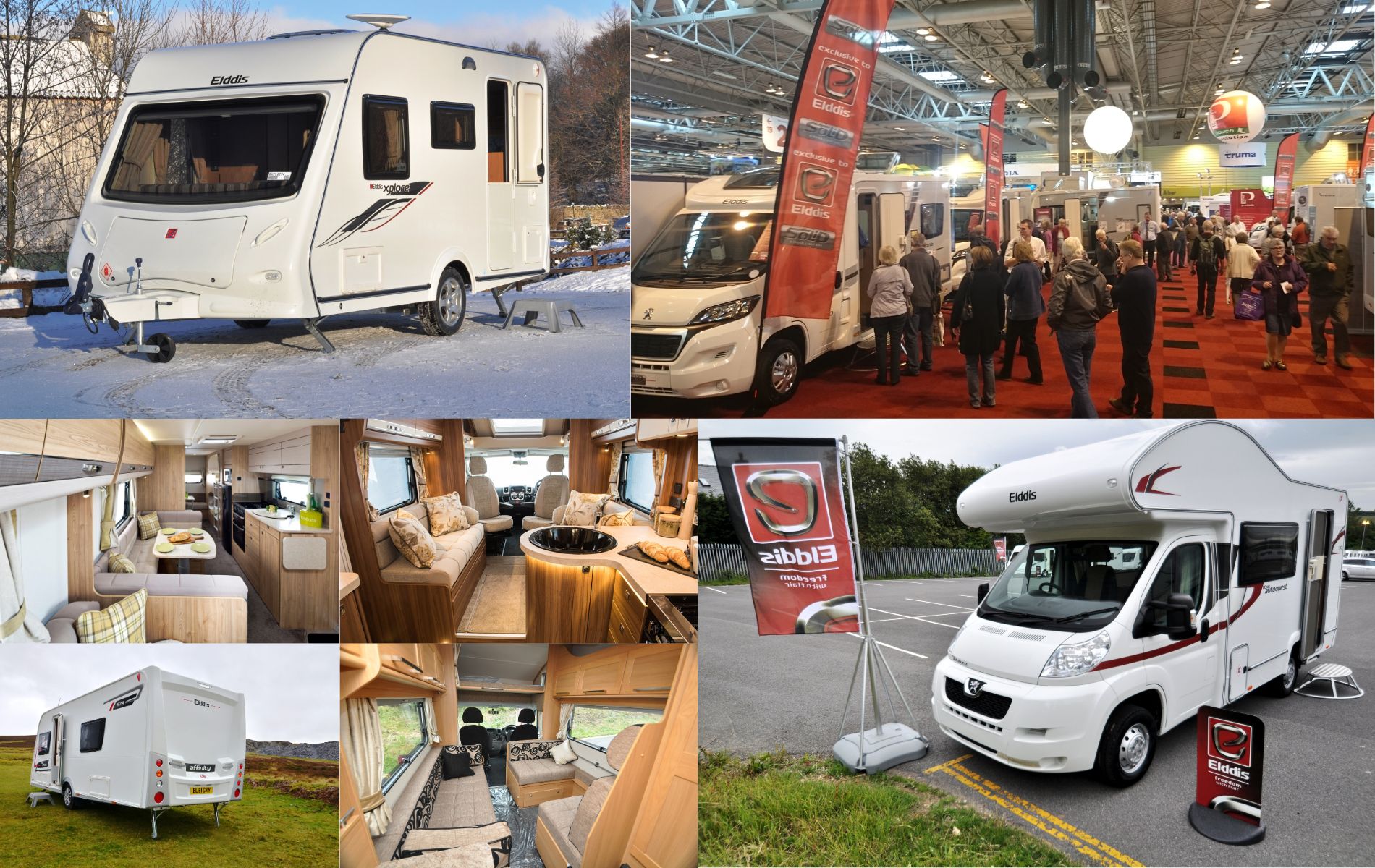
The 2010s
In 2012, the Crusaders received a new distinctive profile; this was to be extended to the Avante and also to the new Affinity range, which replaced Odyssey and was already a big hit with buyers. The creation of the Elddis Affinity saw an all-new single-axle range with Alde central heating – yet no model weighed more than 1500kgs MTPLM, and so were easily towed by the average family car.
Elddis had also introduced GRP protection under all its touring caravan floors by 2012, but by 2013 had implemented class-leading fully-bonded construction. SoLiD Construction (named according to the core tenets: Strong, Light, Dry) was used in the production of every caravan and motorhome – regardless of its price tag – and backed by the company’s 10 Year Water Ingress and Body Integrity Warranty.
2013 saw the launch of the all-new compact coachbuilt motorhome by Elddis – the Accordo. Available in a choice of three layouts, the tardis-like Accordo offered all of sister-range Autoquest’s coachbuilt benefits and specification in a 6m-length vehicle.
At the annual Motorhome and Caravan Show at Birmingham NEC in the October of 2014, Elddis unveiled its all-new luxury motorhome, the Elddis Encore. Loaded with high-end specification (as standard), including Alde central heating, the Encore wowed customers and the motorhome press alike, with its extraordinarily competitive price tag, shaking up this market sector.
In 2017, Elddis continued to innovate. Listening to customer demand, the Elddis Avante range was expanded – quite literally – to include a choice of 8ft-wide twin-axle layouts in the line-up. The Elddis Avante 866 included bunkbeds at the rear and has since evolved into the current-day 868 with its unique double bed and bunk pod configuration. The Avante 840, with its huge front lounge, side dinette/double bed conversion and fixed French bed at rear continues to be a best-seller today!
At the time, the decision to create 8ft-wide touring caravans was somewhat controversial, however, Elddis’ innovation and forward-thinking was quickly copied and 8ft-wide touring caravans are hugely popular and now commonplace in the UK market!
Becoming Part of Erwin Hymer Group
In 2017, not only were Elddis caravans getting bigger, but Elddis itself was about to be part of something enormous!
The Explorer Group (of which Elddis was part) was bought by Industry leaders, Erwin Hymer Group. With their head office based in Bad Waldsee in Southern Germany, Erwin Hymer Group heads up some of the most respected leisure vehicle Brands.
Today, Erwin Hymer Group unites motorhome and caravan manufacturers as well as motorhome and caravan accessory specialists, hire and financing services under one roof. The motorhome and caravan brands Buccaneer, Bürstner, Carado, Crosscamp, Dethleffs, Elddis, Eriba, Etrusco, Hymer, Laika, LMC, Niesmann+Bischoff, Sunlight and Xplore, the motorhome rental companies Crossrent, McRent and rent easy, and also the chassis specialist Goldschmitt, the accessories specialist Movera and the touring portal freeontour all belong to the Erwin Hymer Group.
In 2018, the benefit of being part of Erwin Hymer Group was visually compelling at the Motorhome and Caravan Show at Birmingham NEC. With all EHG Brands united in Hall 20 of the NEC, it literally was a show of force, with an unparalleled level of choice dazzling show visitors and an unprecedented volume of sales.
In 2019, Elddis launched its first range of campervans – the Elddis Autoquest CV range. Built on the Fiat Ducato, these panel van conversions have proved an astounding success and remain best-sellers in the Elddis motorised portfolio. The CV customer-base is ever-growing and customers have even joined forces to create their own CV community – the CV Owners Group - with over 2000 owner-members, who not only chat online but arrange regular meet-ups and CV events!
The 4-berth Elddis Autoquest CV40 was subsequently voted Practical Motorhome’s 2020 Motorhome of the Year, beating off strong competition in every category of motorised product!
A fresh new layout also joined the Elddis Autoquest range. With leanings towards a more continental design (learned from Erwin Hymer Group sister-brands), the new Elddis Autoquest 194 offers raised beds at the rear, with a sizeable garage beneath. Trialled by TV presenter and wildlife filmmaker, Gordon Buchanan, this model continues today in both standard- and retailer special edition format.
Becoming Part of THOR Industries
Only two years after becoming part of the Erwin Hymer Group, EHG itself – in its entirety – was bought by industry-giant THOR Industries (HQ based in Elkhart, Indiana). The THOR Industries family of companies includes huge US names, amongst them: Airstream; Cruiser RV; Dutchmen; Heartland RV; Highland Ridge; Jayco RV; THOR Motor Coach; and many more!
Being a part of both Erwin Hymer Group and, in turn, THOR Industries, means that UK-based Elddis is now part of the World’s largest leisure vehicle manufacturing group.
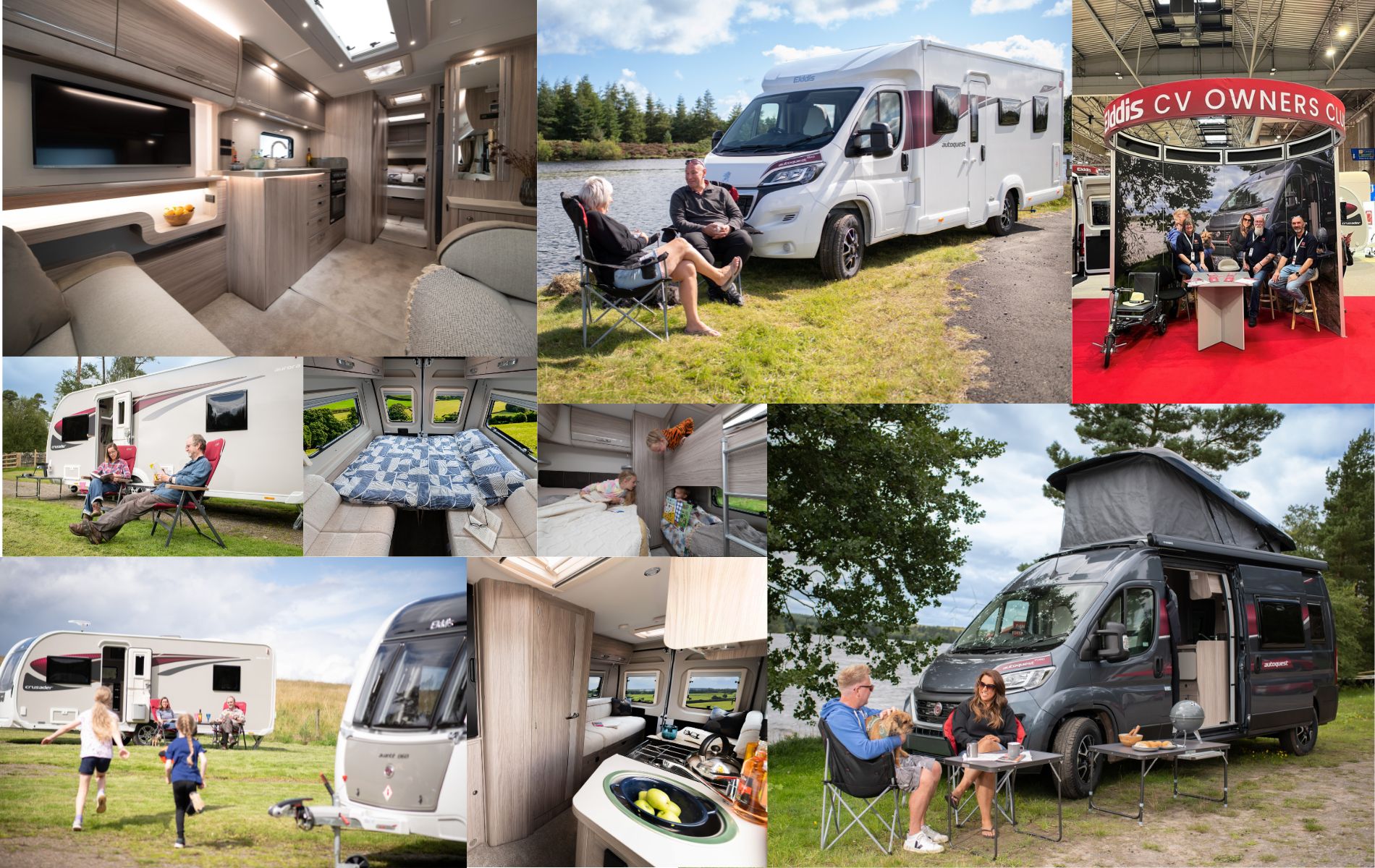
2020 – The Start of a New Decade and the Global Covid Pandemic
In January 2020, Elddis Bloggers David Nolan and Karen Whitney (AKA The Grey Gappers) excitedly set off on the most epic of Elddis adventures, planning a ‘Champagne to Caviar’ roadtrip in the all-new Elddis Encore 250 motorhome, from Reims in France to Baku in Azerbaijan.
By March 2020, the World faced the unprecedented spectre of the Covid pandemic and the Elddis bloggers found themselves isolating, with a group of other intrepid motorhome travellers, on a campsite in Turkiye for many months, watched online and heartened by an army of Elddis fans.
It is perhaps testament to the Elddis motorhome that David and Karen survived the restrictions of isolation and the Turkish heat from the confines of their Encore. So much so, that, by the end of their eventual travels, the pair loved the motorhome so much they bought it from Elddis, to be a permanent part of their life. Like many Elddis owners, their ‘van has a name – theirs is ‘Buster’, and Buster has done them proud!
In 2021, Elddis expanded its Autoquest CV range of campervans, with the addition of the CV80 4-berth Pop-Top – the result of inter-company design and development between Elddis and Hymer. As expected, the eagerly awaited new CV80 was received with great acclaim and remains in demand each Season!
In 2023, Elddis redesigned top-of-the-range Crusader. All models are now 8ft-wide and the range includes not only twin-axle models, but, for the first time, 8ft-wide single-axle models, too. The Crusader Tempest has returned – this time the layout borrowed from best-selling Elddis Avante 868, offering this unique family-friendly set-up with Crusader levels of luxury.
To celebrate Elddis’ 60th anniversary milestone, there will be special 60th Anniversary editions of Elddis Crusader and Autoquest, which will be revealed at the Caravan and Motorhome Club’s Clubfest – of which, Elddis is the main stage sponsor.
Six decades ago, when Siddle and Raymond Cook built their first caravans, little did they know that Elddis would become one of the UK’s longest running manufacturers and be a part of the World’s largest leisure vehicle manufacturing groups!
Elddis - Inspiring travel since 1964






